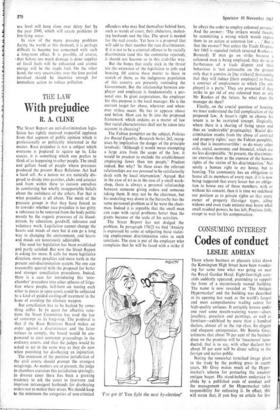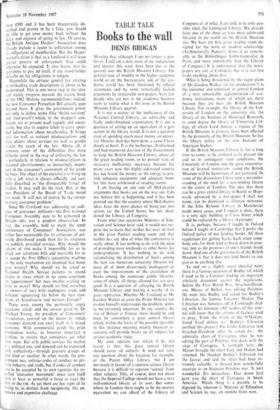Codes of conduct
CONSUMING INTEREST LESLIE ADRIAN
Those whom business or pleasure takes down the Kensington High Street have been wonder- ing for some time what was going on near the Royal Garden Hotel. Eight-foot-high cary- atids suddenly appeared, pretending to support the front of a mysteriously named building. The name is now revealed as 'The Antique Hypermarket' and the building was described at its opening last week as the worltrs largest and most comprehensive trading centre for high-quality antiques. It certainly houses under one roof some mouth-watering wares—silver, jewellery, porcelain and paintings, as well as furniture—exhibited by more than a hundred dealers, almost all in the top class. Its elegant and eloquent entrepreneur,. Mr Bennie Gray, estimates that about 70 per cent of the business done on the premises will be 'incestuous' (con- ducted, that is to say, with other dealers) but about 30 per cent will be direct selling to the foreign and native public.
Noting the somewhat tarnished image given to the trade by the probing press in recent years, Mr Gray makes much of the Hyper- market's scheme for protecting the amateur antique buyer. His stand-holders undertake to abide by a published code of conduct and the management of the Hypermarket takes responsibility for enforcing it. In effect, this will mean that, if you buy an article for less
than 1500 and it has been inaccurately de- scribed and proves to be a fake, you should be able to get your money back without the delay and expense of going to law. Of course, the British Antique Dealers' Association does already include a resort to arbitration among its obligations of membership. But the Hyper- market's claim is that as a landlord it will have oreater powers of enforcement than could otherwise be expected. It also boasts that its
onrantee to pay up itself, if any stand-holder • defaults on his obligations, is unique.
Meanwhile the antique general law relating to misleading trade descriptions is about to be modernised. This is one more step in the slow and stately progress towards the statute book of the 1962 Molony recommendations: indeed, the new Consumer Protection Bill actually goes beyond these. It gives the government power not only to define terms (like `shrink-resistant' and 'rust-proof') which, to the shopper's con- fusion, are at present used vaguely and uncer- tainly. but also to require labels to carry speci- fied information about merchandise. It brings oral (as well as written) misdescriptions and false claims about services (as well as goods) within the reach of the law. Above all, it removes some of the difficulties that have hitherto stood in the way of enforcing the law —particularly in relation to misdescriptions in national advertisements, so increasingly impor- tant in the consumer's assessment of the goods he buys. The object of the exercise is to bring up %lith a jolt what is always officially and tact- fully described as 'the disreputable fringe' of traders. It may well do the trick. But, as the new President of the Board of Trade noted last week, 'It will not, of course, be the answer to every consumer problem.'
Since Mr Crosland was addressing an audi- ence of consumer militants—the first national Consumer Assembly ever to be convened in Britain—this was a prudent observation. In fact, the assembly, held to mark the tenth anniversary of Consumers' Association. was rather less memorable for its criticisms of pri- vately distributed goods than for its strictures on publicly provided services. Why should the advent of STD make it impossible for us to check our telephone bills and inevitable for us to accept the Post Office's accounting machine as the only mechanism yet invented that never goes wrong? Why should we be asked as National Health Service patients to attend clinics at times which in no sense constitute an 'appointment' but may involve waiting an hour or _more? Why should we find ourselves as owners of cars with inadequate roads and deficient signposting far below the best stan- dards of Scandinavia and western Europe?
These were among the pertinently angry questions asked: and the answer given by Dr Michael Young, the president of Consumers' Association, centred on the means b■ which consumer demand can exert itself in a mixed economy. With commercial goods the price mechanism works, in however imperfect a fashion, to ensure that consumers get what they want. But with public services the market is a political one, and demand can be expressed Only collectively—through pressure groups of one kind or another. In other words, the gov- ernment may enforce codes of conduct on pri- vate industry and trade, but if codes of conduct are to be accepted by its own agencies the so- called 'consumer movement' must turn itself into at least as powerful a force as (say) the Tye or the CBI. As yet there are few signs of its rising to, as distinct from recognising. this ex- tensive and expensive challenge.







































 Previous page
Previous page